February 2026

The anxiety disorders treatment market is expected to grow from USD 12.33 billion in 2025 to USD 17.56 billion by 2035, with a CAGR of 3.6% throughout the forecast period from 2026 to 2035.
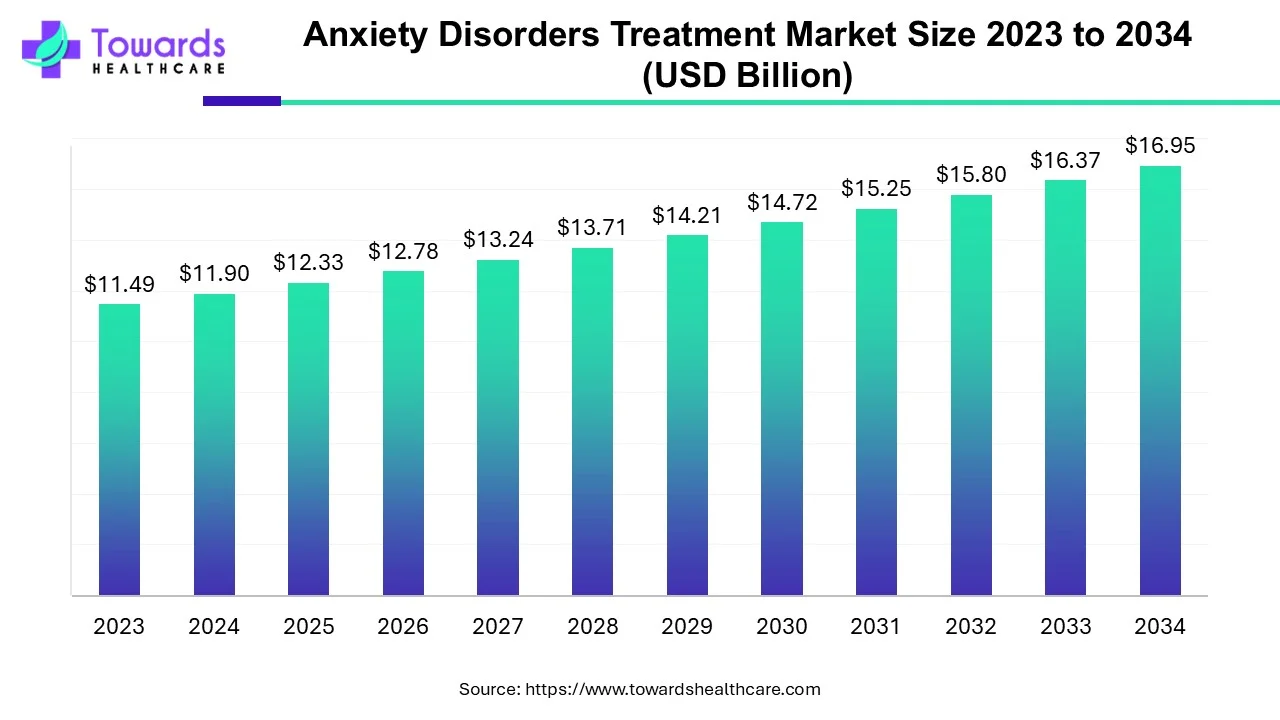
| Key Elements | Scope |
| Market Size in 2026 | USD 12.77 Billion |
| Projected Market Size in 2035 | USD 17.56 Billion |
| CAGR (2026 - 2035) | 3.6% |
| Leading Region | North America |
| Market Segmentation | By Disorder Type, By Treatment, By Hospital Settings, By Geography |
| Top Key Players | Pfizer Inc., Merck KGaA, Sanofi, Bristol-Myers Squibb Company, Elli Lilly, Teva Pharmaceutical Industries, Bayer AG, Biocare Medical, LLC, GSK plc., Mitsubishi Chemical Group Corporation |
There was a 12% rise in the prescription rate of the anti-anxiety drug Zoloft in March 2020. Lockdown measures, economic difficulties, and reduced social interaction have been identified as the primary factors contributing to a notable increase in depression and anxiety cases across North America.
Anxiety disorders are mental health conditions marked by excessive worry, fear, or nervousness that can mess with daily life. They come in various forms like generalized anxiety disorder, panic disorder, social anxiety disorder, and specific phobias. People with these disorders often worry too much, even when there's no real reason. They might also experience physical symptoms like sweating, trembling, or rapid heartbeat. Some may avoid situations that trigger anxiety, leading to isolation or disruption of normal activities. Panic attacks, sudden and intense episodes of fear, are common, bringing along symptoms such as chest pain or difficulty breathing. Sleep troubles are another hallmark, with insomnia or racing thoughts making it hard to rest.
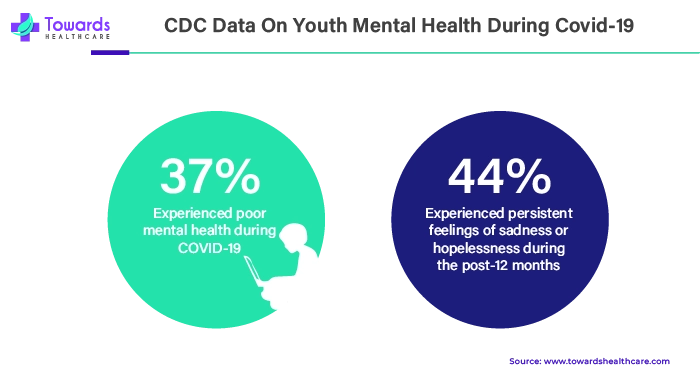
Diagnosing anxiety disorders early and providing proper treatment is vital for several reasons. Untreated anxiety can lead to other mental health issues like depression or substance abuse. effective treatment can greatly improve quality of life, helping individuals manage symptoms and lead fulfilling lives. Chronic stress and anxiety can harm physical health, contributing to problems like heart issues or weakened immunity. Fourthly, anxiety disorders can interfere with relationships and work, so timely diagnosis and treatment can help improve social functioning. Finally, early intervention can prevent anxiety disorders from becoming chronic or more severe, making them easier to treat.
Treatment usually involves a mix of therapy, medication, and lifestyle changes. Cognitive-behavioral therapy (CBT) teaches coping strategies and helps manage anxious thoughts, while medications like SSRIs or benzodiazepines may be prescribed to alleviate symptoms. Lifestyle changes such as exercise, relaxation techniques, and healthy habits can also play a role in managing anxiety.
As people become more aware of mental health issues, like anxiety disorders, they're learning that it's okay to seek help. Before, there used to be a lot of stigma or shame attached to admitting you needed help with your mental health. But now, that's changing. More and more people are talking openly about their struggles, which makes others feel less alone and more comfortable seeking treatment.
This shift in our culture means that people are no longer hiding their anxiety or pretending everything is okay when it's not. They're realizing that anxiety is a real condition that deserves attention, just like any other health problem. And because of this, more individuals are reaching out to professionals for support.
When people feel less judged or embarrassed about their anxiety, they're more likely to take steps to get better. This can include talking to a therapist, trying medication if needed, or exploring other treatment options. And as more people seek help, the demand for anxiety disorder treatments goes up.
It's like a ripple effect – as one person bravely shares their story, it encourages others to do the same. And the more stories we hear, the more we understand that anxiety is something many people deal with, and it's nothing to be ashamed of. So, growing mental health awareness isn't just about understanding anxiety better – it's about creating a world where everyone feels safe and supported in seeking the help they need. And as this cultural shift continues, more and more individuals will have access to the treatment and support they deserve to live happier, healthier lives.
Researchers and scientists are always working hard to find better ways to help people with anxiety disorders. They do this by discovering and creating new treatments. One way they do this is by making new medications. These medications are like special potions that can help calm down the feelings of anxiety in the body and mind. Scientists study different chemicals in the brain to make these medications. Sometimes they also improve existing medications to make them work even better.
But it's not just about pills. Scientists also come up with new therapy techniques. Therapy is like talking to someone who knows a lot about anxiety. Therapists help people understand why they feel anxious and teach them tricks to manage those feelings better. Sometimes they come up with new techniques that work even better than before. And then there are alternative approaches, like digital therapeutics. These are like having a personal coach right on your phone or computer. They use technology to give people tools and exercises to help them deal with anxiety wherever they are. It's like having a little helper in your pocket, reminding you that you're not alone and giving you strategies to feel better.
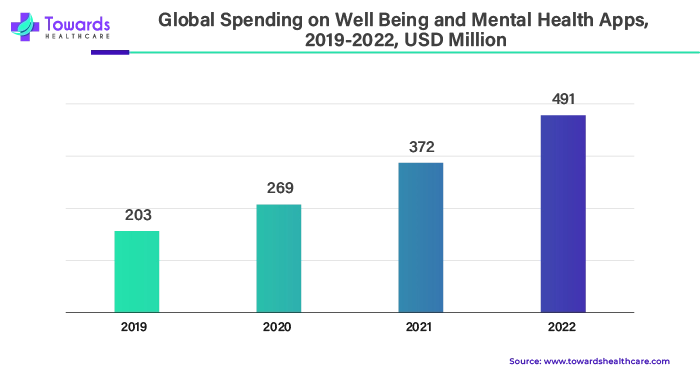
So, all these research efforts are like a big treasure hunt for better ways to treat anxiety. Each discovery brings hope to those struggling with anxiety, showing them that there are more options available to help them feel better and live happier lives. And as scientists continue to explore and innovate, the future looks brighter for everyone dealing with anxiety.
The study analyzed self-reported social anxiety using the Counseling Center Assessment of Psychological Symptoms (CCAPS). Seven social anxiety items were rated on a five-point scale from 0 to 4. Social isolation, a component of the CCAPS Depression subscale, was assessed.
Social anxiety, which is feeling nervous or uncomfortable in social situations, seems to be increasing nowadays. There could be many reasons for this rise. One might be the increased use of social media and technology, which can lead to comparing ourselves to others and feeling inadequate. Also, societal pressures to fit in and be perfect can make people more anxious in social settings. Another factor could be the fast-paced and stressful nature of modern life, leaving less time for meaningful social interactions.
Treating social anxiety involves various approaches. Therapy, like cognitive-behavioral therapy (CBT), is a common treatment. In therapy, individuals learn to challenge negative thoughts and develop coping skills to manage anxiety. Medications, such as antidepressants or anti-anxiety medications, may also be prescribed to alleviate symptoms. Additionally, lifestyle changes like practicing relaxation techniques, regular exercise, and gradually facing feared social situations can be helpful. Support from friends, family, or support groups can also play a crucial role in managing social anxiety.
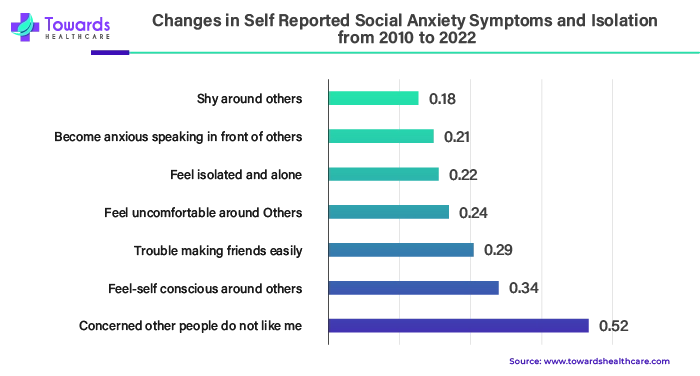
Understanding the factors contributing to social anxiety and seeking appropriate treatment, whether through therapy, medication, lifestyle changes, or support, can help individuals overcome their fears and improve their quality of life.
In some places, there aren't enough mental health professionals, especially those who specialize in working with kids and teens. This means that if someone needs help with their mental health, they might have to wait a long time to see a therapist or psychiatrist. It's like having a really long line at the doctor's office, but for your mind instead of your body. Because there aren't enough specialists, people might not have many choices for treatment. They might have to travel far or wait months just to get an appointment. This can be really frustrating and make it harder for people to get the help they need when they need it.
One reason for this shortage is that becoming a mental health professional takes a lot of time and training. Not enough people choose this career path, so there aren't enough professionals to meet the growing demand for mental health services.
Another problem is that mental health services might not be evenly spread out. Some areas might have plenty of therapists and psychiatrists, while others have hardly any. This can make it even harder for people in those underserved areas to get help. The shortage of mental health professionals, especially in certain areas or specialties, can make it tough for people to access timely and effective treatment for their mental health concerns.
Which Type Segment Dominated the Anxiety Disorders Treatment Market?
The medication segment held a dominant position in the market in 2025, due to high affordability and ease of administration. Antidepressants and antipsychotics are available in oral forms, enhancing patient convenience and treatment compatibility. They help relieve symptoms and provide targeted treatment to patients. The availability of generic alternatives and the increasing development of personalized medications favor the segment’s growth.
Psychotherapy
The psychotherapy segment is expected to grow at the fastest CAGR in the market during the forecast period. Psychotherapy or psychological counseling is beneficial for patients to reduce symptoms. The most widely used psychotherapy is cognitive-behavioral therapy (CBT). It refers to encountering a situation or an object that triggers anxiety in people, helping them to face it and build confidence.
Why Did the Antidepressants Segment Dominate the Anxiety Disorders Treatment Market?
The antidepressants segment held the largest revenue share of the market in 2025, due to the ability to treat a wide range of stress disorders. Antidepressants are the first line of agents for reducing anxiety and enhancing mood. They are generally safe compared to other anti-anxiety drugs and help patients follow a daily routine. They are particularly used for patients suffering from chronic, moderate, and severe depression.
Anti-Anxiety Medications
The anti-anxiety medications segment is expected to grow with the highest CAGR in the market during the studied years. Unlike antidepressants, anti-anxiety medications are particularly beneficial in offering quick, short-term relief for anxiety. They induce a calming effect, reducing feelings of fear, worry, and anxiety. They are prescribed for a short period to reduce the risk of dependency.
How the Adults Segment Dominated the Anxiety Disorders Treatment Market?
The adults segment contributed the biggest revenue share of the market in 2025. Adults are more prone to suffer from anxiety and depression due to a variety of factors, such as social isolation, unemployment, loneliness, chronic illness, or experiencing a traumatic event. Anxiety disorders in adults may significantly impact workplace productivity, necessitating their treatment. They are more aware of undergoing screening, diagnosis, and treatment of anxiety disorders.
Adolescents
The adolescents segment is expected to expand rapidly in the market in the coming years. Adolescents may face peer pressure, substance use disorders, and other behavioral disorders. The increasing use of smartphones and computers offers teens an escape from feeling their emotions, keeping them from building resilience. Several research studies have identified that changes in cultural and social life trigger anxiety in teens.
Which Therapeutic Approaches Segment Led the Anxiety Disorders Treatment Market?
The cognitive behavioral therapy segment led the market in 2025, due to its ability to reduce symptoms of anxiety, depression, post-traumatic stress disorder (PTSD), and more. Cognitive behavioral therapy (CBT) helps gain control of thoughts and dismiss inaccurate beliefs. It promotes emotional regulation by identifying and challenging negative thought patterns. The growing awareness of telehealth and smartphone penetration has potentiated the demand for CBT.
Mindfulness-based Therapy
The mindfulness-based therapy segment is expected to witness the fastest growth in the market over the forecast period. Meditation is one of the examples of mindfulness-based therapy, helping patients to stay in the moment and providing physical and mental health benefits. Mindfulness has reported a tremendous surge in popularity in the past decade. Self-regulation practices focus on training attention and awareness to foster mental well-being.
In North America, where you live can affect how easy it is to get treatment for anxiety. Metro cities like New York, Los Angeles, and Toronto have lots of therapists and places to get help. They have special clinics, therapy centers, and even research places just for anxiety. Places near these big cities, called suburbs, also have some options for treatment, but they might not have as many choices as the big cities. People in the suburbs might need to go into the city for certain types of treatment. Because of the COVID-19 pandemic, more people are using telehealth. This means you can talk to a therapist or doctor from your home using a computer or phone. This is helpful for people who live far away from cities or don't have many options for treatment nearby. Telehealth makes it easier for everyone to get help for anxiety, no matter where they live.
US Market Trends
The U.S. has a well-established research, clinical trial, and healthcare infrastructure, encouraging the development of novel treatment regimens. The National Institute of Mental Health (NIMH) is a government research body that provides funding for mental health research. It supports over 3,000 research grants and contracts nationwide and worldwide. The FY 2025 President’s budget was approximately $2.5 billion.
In some parts of Asia, there's still a lot of shame around mental health issues. This makes it hard for people to talk about their problems or ask for help. Because of this, there aren't always enough resources for treating anxiety disorders. Many countries in Asia struggle to build good mental health services because there aren't enough trained professionals, money, or places for people to get help. Asia is a big and diverse place with lots of different cultures and languages. This affects how people see mental health and what kind of help they want. So, treatments need to understand and respect these cultural differences to help everyone who needs them.
India Market Trends
Anxiety disorders are major concerns among Indian nationals. However, people are becoming aware of such disorders through awareness campaigns, social media platforms, and government initiatives. The Indian government’s TeleMANAS initiative improves access to high-quality mental health care in remote areas. In 2025, over 1.23 million calls were handled on the TeleMANAS helpline.
Europe is expected to grow at a significant CAGR in the upcoming period. The rising prevalence of anxiety disorders, the increasing adoption of advanced technologies, and favorable regulatory policies augment the market. Approximately 25 million people, or 5.4% of the total European population, suffer from anxiety disorders. Government organizations raise awareness about screening and early diagnosis of anxiety disorders, enabling healthcare professionals to provide early intervention.
UK Market Trends
The UK government is at the forefront of raising awareness and providing high-quality treatment for patients with anxiety disorders. It has launched the “Improving Access to Psychological Therapies (IAPT) programme to treat common mental health conditions with good evidence. It also provides NHS Talking Therapies services to provide psychological interventions for adults in England who are struggling with anxiety disorders and/or depression.
The Middle East & Africa are expected to grow at a considerable CAGR in the upcoming period. The increasing prevalence of anxiety disorders, the shifting trend towards traditional medicine, and the rising awareness of early diagnosis contribute to market growth. Government bodies launch initiatives and provide funding to develop novel drugs and treatment regimens for patients with anxiety disorders. The burgeoning healthcare sector and evolving regulatory landscapes also contribute to market growth.
UAE Market Trends
According to a recent survey on 409 individuals above 18 years of age, about 103 participants reported having severe social anxiety in the UAE. The UAE government is undertaking several measures to address mental health issues and reduce the social stigma associated with them. It also supports community mental health treatment to enhance access to a larger patient population.
The anxiety disorder treatment is highly competitive, with numerous players offering a variety of products and services aimed at alleviating anxiety symptoms. Providers range from pharmaceutical companies offering medications to therapy clinics offering counseling services. Medication such as SSRIs and benzodiazepines are commonly prescribed for anxiety disorder, with each medication having its own benefits and side effects, exposure therapy, and mindfulness therapy among others. Technological advancements have also led to the development of digital therapeutics and mobile apps designed to provide support outside of the traditional therapy session.
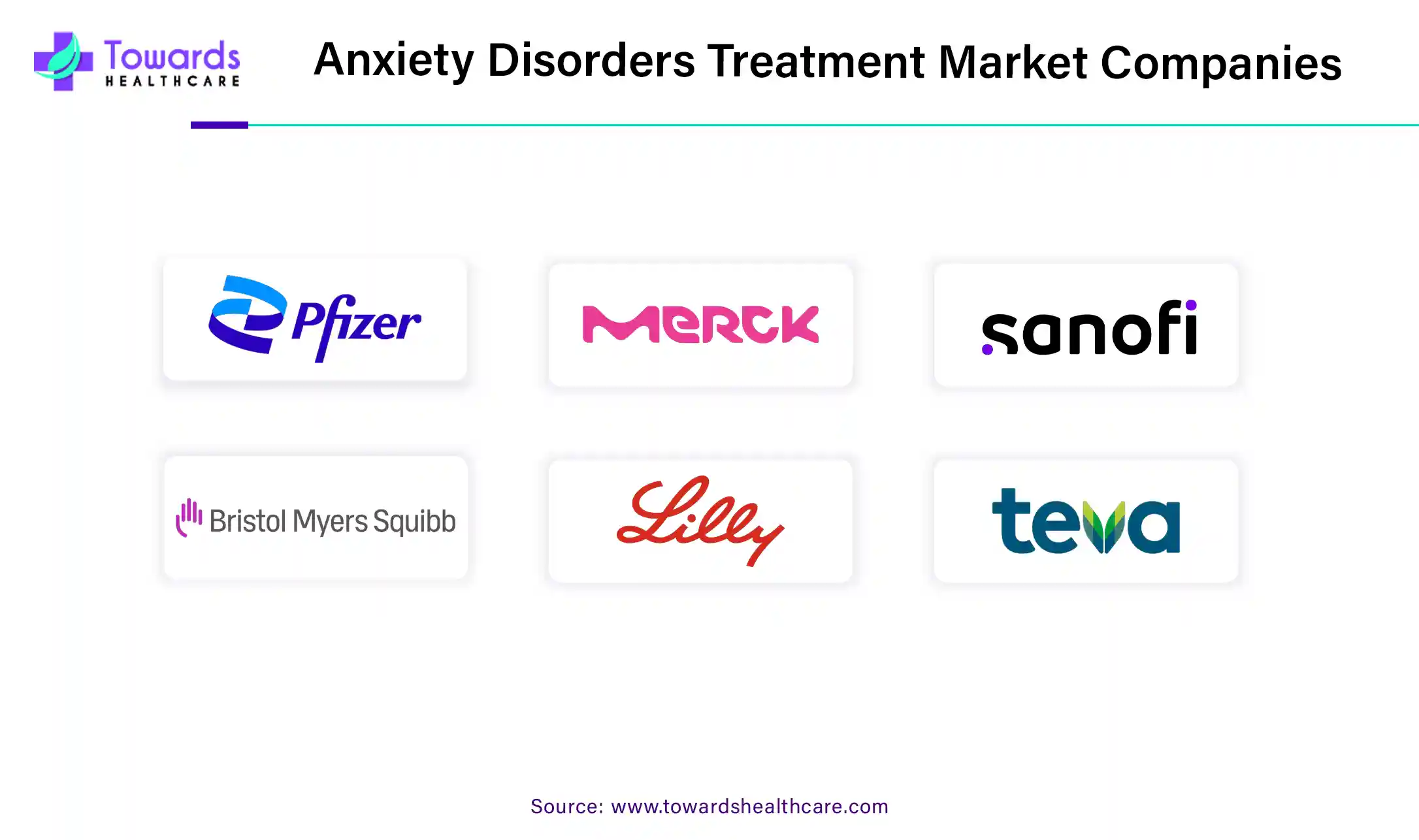
By Type
By Medication Class
By Patient Demographics
By Therapeutic Approaches
By Region
February 2026
January 2026
January 2026
January 2026